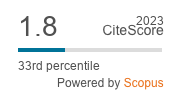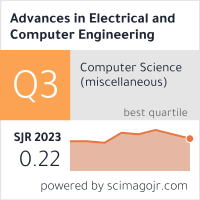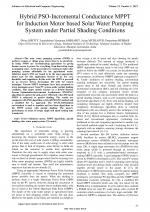| 1/2023 - 10 | View TOC | « Previous Article | Next Article » |
Hybrid PSO-Incremental Conductance MPPT for Induction Motor based Solar Water Pumping System under Partial Shading ConditionsSHETTY, D. |
| Extra paper information in |
| Click to see author's profile in |
| Download PDF |
Author keywords
induction motor, MPPT algorithms, partial shading, solar water pump system, V/f control
References keywords
energy(20), system(15), water(14), pumping(13), power(12), sustain(8), solar(8), shading(8), review(8), renew(8)
Blue keywords are present in both the references section and the paper title.
About this article
Date of Publication: 2023-02-28
Volume 23, Issue 1, Year 2023, On page(s): 87 - 94
ISSN: 1582-7445, e-ISSN: 1844-7600
Digital Object Identifier: 10.4316/AECE.2023.01010
Web of Science Accession Number: 000937345700010
SCOPUS ID: 85150225405
Abstract
The solar water pumping systems (SWPS) is useful in remote or village areas where there is no electricity. In India, SWPS are revolutionizing agriculture by giving farmers access to power for everything, from harvesting crops to pumping water. As the government is working to make solar pumping systems affordable for the agricultural sector, induction motors (IM) are found to be the most appropriate motor type for this application because of its low cost, durability and ruggedness. In this work, the SWPS is powered by an inverter driven three-phase IM with V/f control technique. Various MPPT techniques have been proposed to track maximum power from PV system under partial shading condition. This paper mainly focuses on a hybrid Particle Swarm Optimization-Incremental Conductance (PSO-INC) algorithm to capture the peak power efficiently when IM based SWPS is subjected to partial shading. The results are compared with PSO algorithm, a hybrid PSO-PO method and a modified 0.8 Voc approach. The MATLAB/Simulink environment is used to simulate and test these algorithms on the SWPS system with partial shading. The motor's performance in terms of torque ripple and speed settling time is analyzed. |
| References | | | Cited By |
Web of Science® Times Cited: 6 [View]
View record in Web of Science® [View]
View Related Records® [View]
Updated 5 days, 3 hours ago
SCOPUS® Times Cited: 6
View record in SCOPUS® [Free preview]
View citations in SCOPUS® [Free preview]
[1] RETRACTED ARTICLE: Experimental design and analysis of advanced three phase converter for PV application with WCO-P&O MPPT controller, Krishnaram, K., Sivamani, S., Alaas, Zuhair, Ahmed, M. M. R., Senthilkumar, S., Raj, S. Antony, Scientific Reports, ISSN 2045-2322, Issue 1, Volume 14, 2024.
Digital Object Identifier: 10.1038/s41598-024-61856-z [CrossRef]
[2] A Novel Hybrid MPPT Technique for a PV System Operated Under Partial Shading Conditions with Three Phase Interleaved Boost Converter, Krishnaram, K., Rajakumaran, M., Senthilkumar, S., Mangaiyarkarasi, S. P., Raj, R. Gandhi, Iranian Journal of Science and Technology, Transactions of Electrical Engineering, ISSN 2228-6179, 2025.
Digital Object Identifier: 10.1007/s40998-025-00814-5 [CrossRef]
[3] Soft computing approaches for photovoltaic water pumping systems: A review, Saady, Ikram, Majout, Btissam, Adouairi, Mohamed Said, Karim, Mohammed, Bossoufi, Badre, Almalki, Mishari Metab, Alghamdi, Thamer A.H., Cleaner Engineering and Technology, ISSN 2666-7908, Issue , 2024.
Digital Object Identifier: 10.1016/j.clet.2024.100800 [CrossRef]
[4] Robust soft computing optimized PWM-enhanced IFOC control for hybrid solar–fuel cell induction motor drives in water pumping systems, Kumar, Rahul, Naik, M. Venkatesh, International Journal of Hydrogen Energy, ISSN 0360-3199, Issue , 2025.
Digital Object Identifier: 10.1016/j.ijhydene.2025.05.047 [CrossRef]
Disclaimer: All information displayed above was retrieved by using remote connections to respective databases. For the best user experience, we update all data by using background processes, and use caches in order to reduce the load on the servers we retrieve the information from. As we have no control on the availability of the database servers and sometimes the Internet connectivity may be affected, we do not guarantee the information is correct or complete. For the most accurate data, please always consult the database sites directly. Some external links require authentication or an institutional subscription.
Web of Science® is a registered trademark of Clarivate Analytics, Scopus® is a registered trademark of Elsevier B.V., other product names, company names, brand names, trademarks and logos are the property of their respective owners.
Faculty of Electrical Engineering and Computer Science
Stefan cel Mare University of Suceava, Romania
All rights reserved: Advances in Electrical and Computer Engineering is a registered trademark of the Stefan cel Mare University of Suceava. No part of this publication may be reproduced, stored in a retrieval system, photocopied, recorded or archived, without the written permission from the Editor. When authors submit their papers for publication, they agree that the copyright for their article be transferred to the Faculty of Electrical Engineering and Computer Science, Stefan cel Mare University of Suceava, Romania, if and only if the articles are accepted for publication. The copyright covers the exclusive rights to reproduce and distribute the article, including reprints and translations.
Permission for other use: The copyright owner's consent does not extend to copying for general distribution, for promotion, for creating new works, or for resale. Specific written permission must be obtained from the Editor for such copying. Direct linking to files hosted on this website is strictly prohibited.
Disclaimer: Whilst every effort is made by the publishers and editorial board to see that no inaccurate or misleading data, opinions or statements appear in this journal, they wish to make it clear that all information and opinions formulated in the articles, as well as linguistic accuracy, are the sole responsibility of the author.



